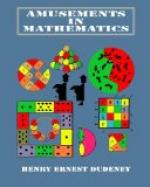There are no morals in puzzles. When we are solving the old puzzle of the captain who, having to throw half his crew overboard in a storm, arranged to draw lots, but so placed the men that only the Turks were sacrificed, and all the Christians left on board, we do not stop to discuss the questionable morality of the proceeding. And when we are dealing with a measuring problem, in which certain thirsty pilgrims are to make an equitable division of a barrel of beer, we do not object that, as total abstainers, it is against our conscience to have anything to do with intoxicating liquor. Therefore I make no apology for introducing a puzzle that deals with betting.
Three horses—Acorn, Bluebottle, and Capsule—start in a race. The odds are 4 to 1, Acorn; 3 to 1, Bluebottle; 2 to 1, Capsule. Now, how much must I invest on each horse in order to win L13, no matter which horse comes in first? Supposing, as an example, that I betted L5 on each horse. Then, if Acorn won, I should receive L20 (four times L5), and have to pay L5 each for the other two horses; thereby winning L10. But it will be found that if Bluebottle was first I should only win L5, and if Capsule won I should gain nothing and lose nothing. This will make the question perfectly clear to the novice, who, like myself, is not interested in the calling of the fraternity who profess to be engaged in the noble task of “improving the breed of horses.”
391.—THE MOTOR-CAR RACE.
Sometimes a quite simple statement of fact, if worded in an unfamiliar manner, will cause considerable perplexity. Here is an example, and it will doubtless puzzle some of my more youthful readers just a little. I happened to be at a motor-car race at Brooklands, when one spectator said to another, while a number of cars were whirling round and round the circular track:—
“There’s Gogglesmith—that man in the white car!”
“Yes, I see,” was the reply; “but how many cars are running in this race?”
Then came this curious rejoinder:—
“One-third of the cars in front of Gogglesmith added to three-quarters of those behind him will give you the answer.”
Now, can you tell how many cars were running in the race?
PUZZLE GAMES.
“He that is beaten may
be said
To lie in honour’s truckle
bed.”
HUDIBRAS.
It may be said generally that a game is a contest of skill for two or more persons, into which we enter either for amusement or to win a prize. A puzzle is something to be done or solved by the individual. For example, if it were possible for us so to master the complexities of the game of chess that we could be assured of always winning with the first or second move, as the case might be, or of always drawing, then it would cease to be a game and would become a puzzle. Of course among the young and uninformed, when the




